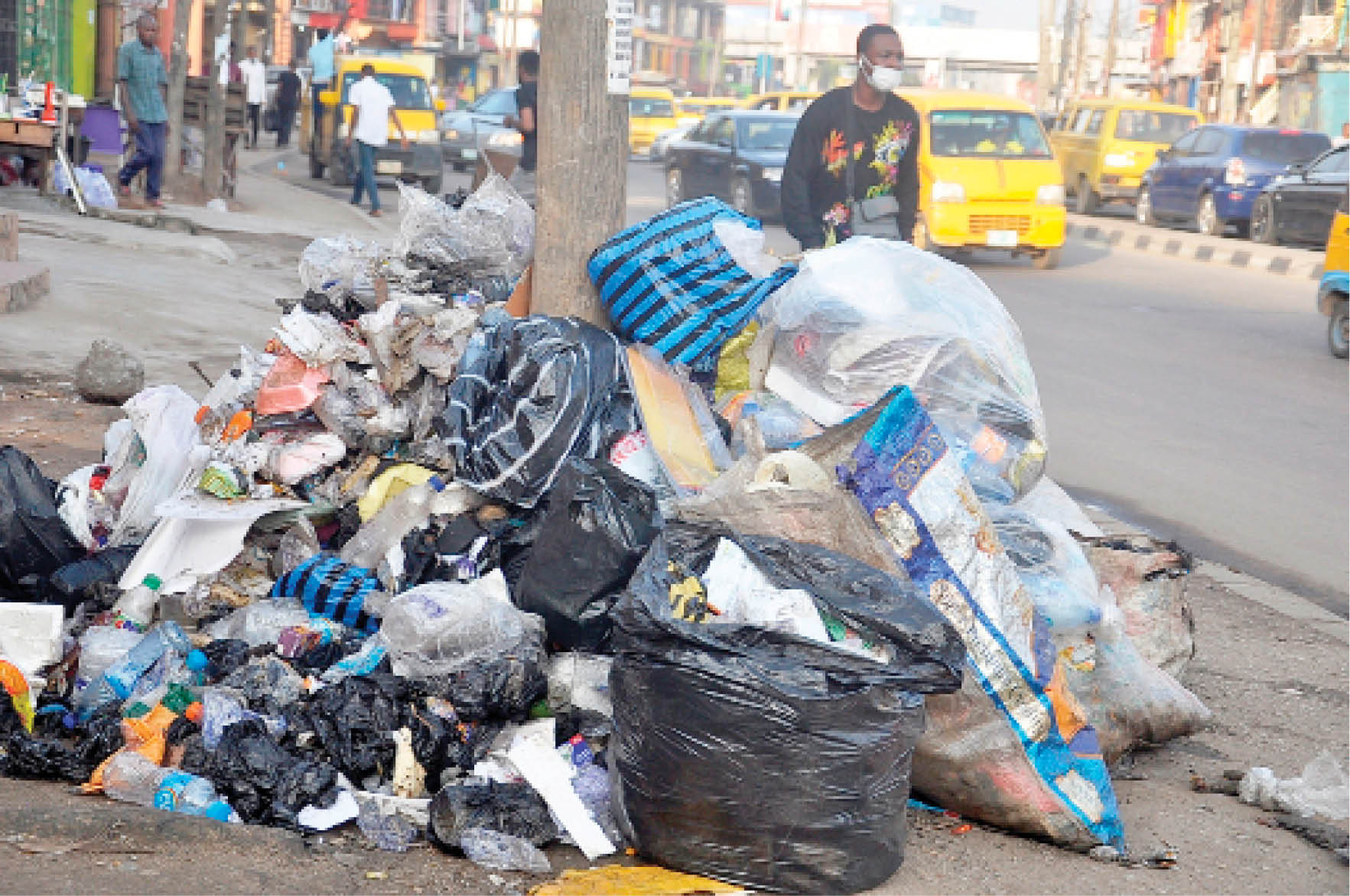Improper and indiscriminate disposal of nylon bags by residents of Lagos and other cities in Nigeria has become quite worrisome to concerned stakeholders, especially considering its environmental and health implications. Our correspondent focuses on this unwholesome practice in Lagos, the country’s commercial hub.
It was early in the morning and Mr Chinonso wanted light food. He strolled to the nearest pap and beans-cake (akara) seller in Beesam, Oshodi for his breakfast. He quickly drank his pap in the container there and ate some balls of akara, which were wrapped in a paper and nylon. He ate the remaining akara on his way to work. After eating, he threw the nylon on the road.
Chinonso’s action is a common practice in Lagos, Nigeria’s commercial city, as sachet (pure) water, ice cream, cereals and many other items are packaged in nylons and subsequently disposed of indiscriminately. At the markets, hundreds of men and women sell their goods with polythene bags. Roadside traders and hawkers also sell suya, fried yam, groundnut, fruits using polythene bags. So thousands of polythene bags exchange hands at different locations every day.
These non-biodegradable items not only block drainages, they also clog waterways, litter the streets and sewage banks.
According to statistics published by Emeka Dumbili and Lesley Henderson in researchgate.net over 60 million plastic sachet water bags are consumed and disposed daily in Nigeria and plastic shopping bags (nylons); and takeaway packs are seen everywhere.
They further stated that Nigeria was widely reported as having released up to 0.34 million tonnes of plastic debris into the ocean in 2010 and was ranked the ninth country in the world for pollution of marine environment. Lagos alone is said to generate 9,000 tonnes of waste daily, out of which 86 per cent is caused by plastic bottles and bags.
In the research, published in March 2020, both Dumbili and Henderson identified the problem as lack of awareness of the environmental and potential health risks of plastic pollution, poor resourcing of waste management and recycling infrastructure, unskilled/inadequate waste collection workforce and untimely litter collection, which potentially exacerbate pollution.
Suggesting the way out of the menace, both Dumbili and Henderson mentioned the need to change the political and social will in Nigeria, regulate use of shopping bags through taxes/levies, adding that refillable sachet water bags could be introduced. Investing in waste collection and recycling infrastructure should be prioritised, they stressed.
In an article on plastic wastes published in ncbi by O. Kehinde and two other authors, they demanded an urgent need for recycling plastic wastes into a solution for wealth creation in Nigeria.
According to the executive director of the Centre for Early Green Education (CEGE), Douglas Omoruyi, “Many people are not actually using proper disposal methods. People are used to dumping polythene and other items in drainages, and they don’t see anything wrong with that kind of behaviour.
“It also persists because the right government policies are not being implemented; enforcement of the environmental law is poor. There are many polythene flooding the streets because our businesses are informal. People selling do not care how you dispose of the bags.
“The implication of persistent dumping of polythene, which is categorised as plastics, is that it will eventually lead to flooding as it blocks drainages. Water will always find its way and roads and houses would be flooded. We are not listening to nature, and that is why many are rendered homeless during flooding. People are the architects of their own misfortune.”
A Lagos-based non-governmental organisation, ED, also noted, “It is important that we look for other means of packaging. There will always be indiscriminate dumping of plastics generally as long as it is available to the people. In some parts of the world, they have banned single-use plastics. It is not all plastics that environmentalists are against; they are only against single-use plastics such as the plastic bags, pure water plastic, the Styrofoam and others.
“There is nowhere in the world that there are no plastics, but they regulate its use. For instance, when I went to Germany for a conference on climate change, they actually asked if I needed a nylon bag and I said yes since we are used to it in Nigeria, but by the time the cashier punched in my bill, I could not believe it. I realized I should have brought my bag to the shop. They charged extra for that nylon bag, just to discourage people from getting it. It is a cost to the environment and you will have to pay for it,” Omoruyi added.
Offering a solution, he said polythene could be reduced through government legislation. Aside that, he said there was a need for constant environmental education where people would be reminded of the danger in dropping polythene indiscriminately, stressing that by implication, “polythene use affects our health.”
As an alternative to single-use plastics, Omoruyi suggested sacks as they last longer. Nylons, he said, are for single use.
“The world is moving to a circular economy where companies who produce have to monitor their products from the factory to the consumer until it gets back to them. If this is not done, people will continue to throw things into the environment as if the environment would take care of it. The environment will take care of only what is biodegradable like plants and leaves. Our fishes are affected as the indiscriminate dumping ends up in the water,” he further said.

The environmentalist admitted that recycling the products would help reduce its impact and curtail the prevalence of plastics in the society.
A Lagos resident who lives in Mafoluku, Oshodi, Mrs Faridah Fawaz said, “I do not drink sachet water, so I avoid dumping polythene bags on the road. I only take bottled water. I have noticed how people dump nylon on the road. If they are in a vehicle or bike, they also drop it on the road. The sad part is that it flows into the drainages. And this is what I think is causing blockages.
“This can be reduced in Lagos if the government is ready to enforce environmental laws. They should get a good task force and arrest people for dumping nylons on the road. When people know that they would be arrested, they will stop. The problem with this is that most of the time, the task force will start taking bribes and let them go.”
Another resident, AbdulRahman Sanni, who manages a gas shop, told our correspondent that although he disposed of his nylons in the waste bin, the people around him do not do the same. According to him, rats usually carry nylons disposed indiscriminately in other places into his gas shop every day.
“Sometimes the rats carry it outside the shop and I have to sweep the dirt I didn’t use. It is either I take it to the dustbin or throw it anywhere I see. It is quite painful that I have to pack nylons every time. If it was well kept, it would not be accessible for the rats,” he lamented.
Recently, the Lagos State Environmental Protection Agency (LASEPA) partnered with the Cleaning Practitioners Association of Nigeria to hold a sensitisation walk and clean-up exercise to mark the World Environment Day.
The sensitisation was held to advocate proper plastic waste disposal among Lagos residents to reduce pollution in the state and encourage ‘waste-to-wealth’ initiatives through a campaign tagged, “Trash for Cash.”
During the World Environment Day, titled, Ecosystem Restoration, both the government agency and the practitioners called for a collective action against indiscriminate disposal of plastics and all other recyclable wastes in water bodies to prevent drinking polluted water and eating poisoned sea foods.
On his part, the general manager of the LASEPA, Dr Dolapo Fasawe, indicated that there was a need to educate Lagos residents on the consequences of indiscriminate disposal of plastics, its effects on the environment, benefits of recycling and clean environmental practices to life.
To reduce the burden of plastics in the environment, recycling used plastics has been encouraged by all stakeholders.
“Waste-to-wealth is a sustainable international initiative recognised worldwide, with the objective of generating less waste, encouraging reusable materials, as well as promoting recycling and conversion of waste to new products, which translate into income generation and job opportunities for our people,” Fasawe explained.
He enjoined residents to apply self-regulation and enforcement to stem plastic pollution as the government cannot be everywhere to monitor and supervise all activities.
“These plastics (polythene inclusive) are treasure raw materials. Manufacturers are eagerly searching to recycle them into new useful products in exchange for cash rewards. Ironically, somebody’s waste is another person’s useful material. Our cash-for-trash initiative was to discourage disposal of plastics in the drains and other water channels so that they would not end up as foods and the water we drink,” he added.

 Join Daily Trust WhatsApp Community For Quick Access To News and Happenings Around You.
Join Daily Trust WhatsApp Community For Quick Access To News and Happenings Around You.

